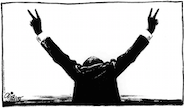
The New Yorker story about the first term of President Trump had a very important idea that I wasn't focusing on before reading the piece, maybe you weren't either..
First, it seems likely that if Trump were elected he'd have a Republican Congress to work with, both houses. Of course since Trump isn't a normal Republican that doesn't mean they would cooperate on everything, and it's unlikely the Republicans would have a 60-vote majority needed to override a filibuster.
But here's the thing -- it's hard to stop a president using the constitutional checks and balances if he's determined. The court moves slowly and it doesn't have a means of enforcement. Congress can pass laws, but previous presidents have ignored laws that are in their way, so why wouldn't President Trump? If Trump decides to use the military to stop protests, for example, which is against the law, it will be hard to stop him.
The story points out that when Nixon wanted to use executive power in questionable ways, Cabinet officers intervened. Nixon backed down. Maybe that will happen with Trump, but maybe not. It'll be a Republican Senate ratifying his choices for Cabinet officers.
Here's the relevant excerpt:
The courts, Posner added, are slow. “If you have a President who is moving very quickly, the judiciary can’t do much. A recent example of this would be the war on terror. The judiciary put constraints on President Bush—but it took a very long time.”
It seems we're in for a roller coaster ride when (if) Trump takes office.